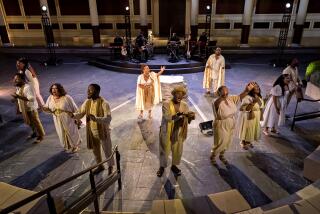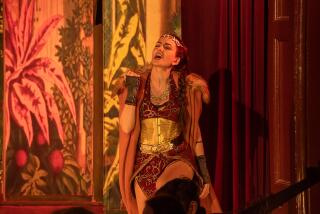RECORD REVIEW : A Passionate, All-Star ‘Oedipe’
- Share via
Enesco: “Oedipe.” Brigitte Fassbaender, Marjana Lipovsek, Barbara Hendricks, Jose Van Dam, Nicolai Gedda, John Aler, Gabriel Bacquier; Orfeon Donostiarra; Orchestre Philharmonique de Monte Carlo conducted by Lawrence Foster. EMI-Angel CDCB 54011 (two CDs).
The compact disc era has produced few operatic discoveries as intriguing as Georges Enesco’s heroic retelling of Sophocles’ Theban plays, a curiously neglected, stylistically eclectic masterwork, which emerges as a revelation in EMI-France’s all-star effort.
American audiences who know Enesco primarily through his two “Romanian Rhapsodies” or in his guises as violinist or conductor will encounter an opera of both surpassing ambition and crafty economy. Deploying a high-minded rhymed French text by Edmond Fleg, “Oedipe” reserves the narrative material of “Oedipus Rex” and “Oedipus at Colonus” for its third and fourth acts, devoting the first two acts to mythic material (Oedipus’ encounter with the Sphinx, the slaying of Laius) that is only discussed in Sophocles.
Although filled with incident, the 2 1/2-hour work proceeds in a stately, monumental, neoclassical manner, mingling declamation, song, instrumental interludes and choral apostrophes. Enesco’s fastidiousness in composing what was evidently conceived as a magnum opus may have been responsible for the long gestation period (1921-1932) of “Oedipe”; the premiere was produced in 1936 by the Paris Opera, where it was not heard for the succeeding 27 years, until the Bucharest Opera Company brought it to the Salle Garnier.
Stylistic influences pervade the polyphonic textures of the work; Debussyan impressionism and German expressionism surface, and Enesco emulates Bartok in the interweaving of folkloric motifs, like the Romanian doina , into the orchestral fabric. Perhaps the most palpable presence is that of Gabriel Faure, whose flexible vocal line in “Penelope” proved a pervasive influence on Enesco. However, the latter’s melding of austerity and sensuality transcends both.
Enesco’s bare toehold on the contemporary repertory can be attributed to the heroic efforts of Lawrence Foster, whose (deleted) recordings of the composer’s orchestral works with the Monte Carlo Philharmonic on Erato in the mid-1980s were of the caliber that reorders priorities. “Oedipe” similarly benefits from Foster’s passionate advocacy; he invests the opera with a fervor and sweep you don’t find in the average recorded project.
In the title role, Van Dam adds even more luster to his glowing reputation with a performance that revels in elegant French projection and basso richness. The stellar casting (Fassbaender as Jocasta, Hendricks as Antigone, Bacquier as Creon) extends even to the smallest assignments (Gedda in the brief role of the Shepherd).
EMI’s engineers have wrapped “Oedipe” in a warm acoustic, which only occasionally (in the hollowly registered Sphinx scene) descends to gimmickry. In all, this may have started as a labor of love; it ended as a triumph of the recording arts.
More to Read
The biggest entertainment stories
Get our big stories about Hollywood, film, television, music, arts, culture and more right in your inbox as soon as they publish.
You may occasionally receive promotional content from the Los Angeles Times.










